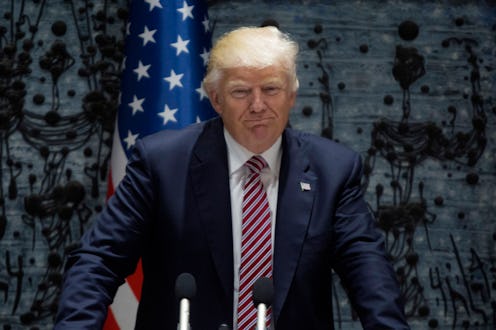
President Donald Trump's proposed budget is expected to be revealed on Tuesday and it, unfortunately, seems to include massive cuts to popular and widely-used programs. More specifically, Trump's budget proposes an $800 billion cut to Medicaid over the next ten years, something which, if implemented, would be incredibly detrimental for low-income Americans — particularly women.
On Monday, CNN reported that a senior administration official confirmed that Trump's proposed budget will include $800 billion in cuts to Medicaid, a program which helps cover healthcare expenses for low-income adults and children as well as disabled individuals and the elderly. Notably, this proposal lies directly counter to Trump's campaign promise that he would never cut Medicaid benefits for Americans. Trump's proposed budget and related Medicaid cuts assume that the American Health Care Act (AHCA), which recently passed the House, will become law, as the Act significantly diminishes federal support for Medicaid.
According to CNN, under the AHCA, states that previously expanded their Medicaid to include low-income adults would no longer receive "enhanced" federal funding to help cover these costs and states that never expanded their coverage would no longer be allowed to do so. Moreover, the entire Medicaid program would see diminished federal funding, with, according to the Washington Post, the Congressional Budget Office estimating that the cuts would result in around 10 million Americans losing Medicaid benefits over the next ten years.
An enormous slash to federal Medicaid funding would be hugely detrimental for many low-income Americans and it would particularly and disproportionately harm women. According to the Center on Budget and Policy Priorities (CBPP), Medicaid cuts stemming from the implementation of the AHCA would "disproportionately affect women due to the higher proportion of women who rely on Medicaid and the specific services at risk of cuts." The CBPP reported that nearly 40 million American women rely on Medicaid and make up the majority (53 percent) of Medicaid recipients. Moreover, women are the primary recipients of Medicaid-funded reproductive health services and are also much more likely than men to use Medicaid services as they age.
If these substantial Medicaid cuts are enacted, women would be hit particularly hard when it comes to family planning services and maternity care. For example, according to the CBPP, the AHCA bars "states from reimbursing Planned Parenthood for its preventive health and family planning services for women and men enrolled in Medicaid." This means that 15 percent of women on Medicaid who use Planned Parenthood for these services would completely lose access to them. Moreover, Medicaid expansion has enhanced Medicaid eligibility so that many women now have "continuous access" to primary healthcare and family planning services during but also before and after their pregnancies. Cutting federal funding for Medicaid expansion could vastly reduce the pool of women which Medicaid can help support, something which would have a detrimental impact on women's health.
In addition to their reliance on Medicaid for reproductive health services, women are more likely to use Medicaid funding for long-term care as they age. According to the CBPP, "Women live longer than men and are significantly more likely to need long-term care services through Medicaid. 69 percent of the 9 million dually eligible beneficiaries — people covered by both Medicare [a federal health insurance program for Americans over age 65] and Medicaid — are women." Thus, substantial cuts to Medicaid could certainly impact the amount of funds available for women's long-term care as they grow older.
Overall, Trump's proposed Medicaid cuts could profoundly negatively affect millions of low-income Americans and, sadly, women will be even more disproportionately affected by these cuts as a result of their increased reliance on Medicaid and the unique types of services with which Medicaid provides them. Hopefully, for the sake of everyone, these cuts will not come to fruition — a prospect which at least seems somewhat promising, considering even many Senate Republicans have expressed significant qualms about rolling back the Medicaid expansions created under Obamacare.